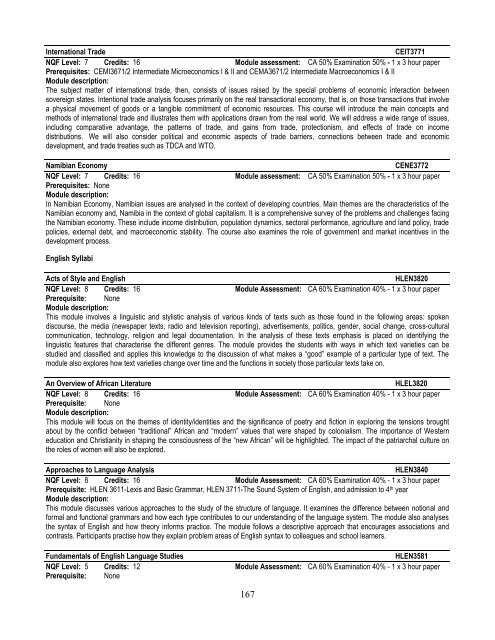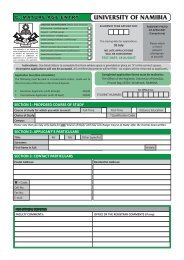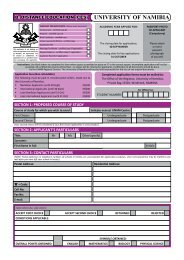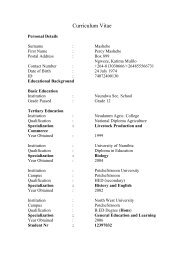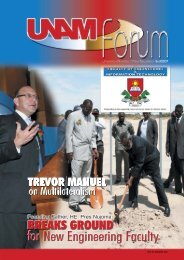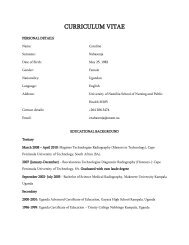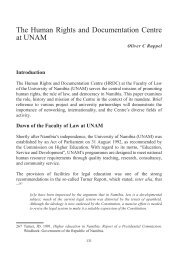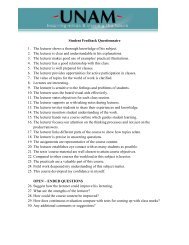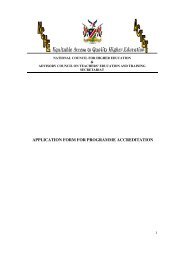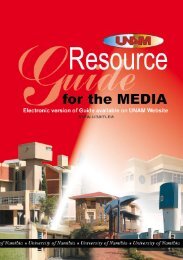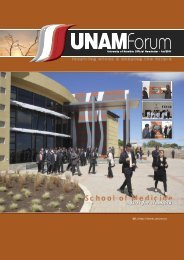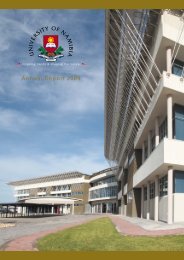UNIVERSITY OF NAMIBIA CENTRE FOR EXTERNAL STUDIES ...
UNIVERSITY OF NAMIBIA CENTRE FOR EXTERNAL STUDIES ...
UNIVERSITY OF NAMIBIA CENTRE FOR EXTERNAL STUDIES ...
Create successful ePaper yourself
Turn your PDF publications into a flip-book with our unique Google optimized e-Paper software.
International TradeCEIT3771NQF Level: 7 Credits: 16 Module assessment: CA 50% Examination 50% - 1 x 3 hour paperPrerequisites: CEMI3671/2 Intermediate Microeconomics I & II and CEMA3671/2 Intermediate Macroeconomics I & IIModule description:The subject matter of international trade, then, consists of issues raised by the special problems of economic interaction betweensovereign states. Intentional trade analysis focuses primarily on the real transactional economy, that is, on those transactions that involvea physical movement of goods or a tangible commitment of economic resources. This course will introduce the main concepts andmethods of international trade and illustrates them with applications drawn from the real world. We will address a wide range of issues,including comparative advantage, the patterns of trade, and gains from trade, protectionism, and effects of trade on incomedistributions. We will also consider political and economic aspects of trade barriers, connections between trade and economicdevelopment, and trade treaties such as TDCA and WTO.Namibian EconomyCENE3772NQF Level: 7 Credits: 16 Module assessment: CA 50% Examination 50% - 1 x 3 hour paperPrerequisites: NoneModule description:In Namibian Economy, Namibian issues are analysed in the context of developing countries. Main themes are the characteristics of theNamibian economy and, Namibia in the context of global capitalism. It is a comprehensive survey of the problems and challenges facingthe Namibian economy. These include income distribution, population dynamics, sectoral performance, agriculture and land policy, tradepolicies, external debt, and macroeconomic stability. The course also examines the role of government and market incentives in thedevelopment process.English SyllabiActs of Style and EnglishHLEN3820NQF Level: 8 Credits: 16 Module Assessment: CA 60% Examination 40% - 1 x 3 hour paperPrerequisite: NoneModule description:This module involves a linguistic and stylistic analysis of various kinds of texts such as those found in the following areas: spokendiscourse, the media (newspaper texts, radio and television reporting), advertisements, politics, gender, social change, cross-culturalcommunication, technology, religion and legal documentation. In the analysis of these texts emphasis is placed on identifying thelinguistic features that characterise the different genres. The module provides the students with ways in which text varieties can bestudied and classified and applies this knowledge to the discussion of what makes a “good” example of a particular type of text. Themodule also explores how text varieties change over time and the functions in society those particular texts take on.An Overview of African LiteratureHLEL3820NQF Level: 8 Credits: 16 Module Assessment: CA 60% Examination 40% - 1 x 3 hour paperPrerequisite: NoneModule description:This module will focus on the themes of identity/identities and the significance of poetry and fiction in exploring the tensions broughtabout by the conflict between “traditional” African and “modern” values that were shaped by colonialism. The importance of Westerneducation and Christianity in shaping the consciousness of the “new African” will be highlighted. The impact of the patriarchal culture onthe roles of women will also be explored.Approaches to Language AnalysisHLEN3840NQF Level: 8 Credits: 16 Module Assessment: CA 60% Examination 40% - 1 x 3 hour paperPrerequisite: HLEN 3611-Lexis and Basic Grammar, HLEN 3711-The Sound System of English, and admission to 4 th yearModule description:This module discusses various approaches to the study of the structure of language. It examines the difference between notional andformal and functional grammars and how each type contributes to our understanding of the language system. The module also analysesthe syntax of English and how theory informs practice. The module follows a descriptive approach that encourages associations andcontrasts. Participants practise how they explain problem areas of English syntax to colleagues and school learners.Fundamentals of English Language StudiesHLEN3581NQF Level: 5 Credits: 12 Module Assessment: CA 60% Examination 40% - 1 x 3 hour paperPrerequisite: None167


